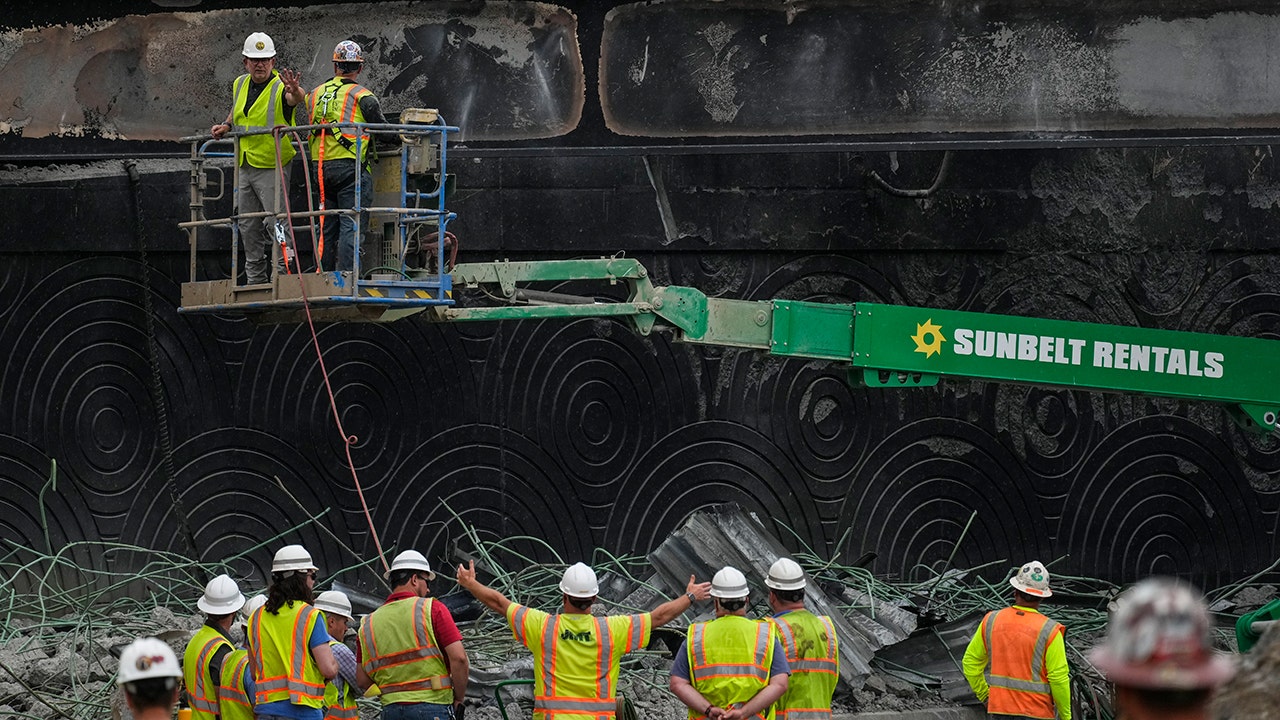A protest outside of a synagogue in Los Angeles’s most densely populated Jewish enclave on Sunday drew unusually swift and forceful condemnation from top Democratic leaders including President Biden, reigniting debates about the boundaries of acceptable protest as tensions over the war in Gaza continue to flare across the country.
The president, along with Gov. Gavin Newsom of California and Mayor Karen Bass of Los Angeles, joined Jewish groups in seeking to cast synagogues and other houses of worship as off-limits to demonstrators.
“Intimidating Jewish congregants is dangerous, unconscionable, antisemitic, and un-American,” Mr. Biden said in a statement posted on Monday on social media. “Americans have a right to peaceful protest. But blocking access to a house of worship — and engaging in violence — is never acceptable.”
Pro-Palestinian groups criticized that characterization, defending Sunday’s demonstration and arguing that protesting an event at a synagogue was not inherently antisemitic.
In this case, demonstrators were protesting a real estate fair at Adas Torah synagogue, where attendees were invited to meet “representatives of housing projects in all the best Anglo neighborhoods in Israel” on Sunday afternoon.
It was unclear whether some of the property sales being promoted at the event were in disputed territory that could make them illegal under international law. Similar events, which have taken place for decades, have drawn protests in the past, particularly during the current violence in Gaza.
In March, for instance, hundreds protested outside an Orthodox Jewish synagogue in Teaneck, N.J., where Israeli real estate companies were advertising property to prospective American buyers.
Mr. Biden was, in essence, claiming that it adhered to American values “to use a place of worship to illegally sell ‘Anglo neighborhoods’ on stolen, occupied land,” organizers with the antiwar activist group Code Pink, which supported Sunday’s demonstration, said in a statement. “This mischaracterization by President Biden is outrageous and has real consequences.”
Rabbi Dovid Revah of Adas Torah said the event was the first of its kind that the synagogue had hosted, and it would probably be the last. Still, he disputed that the event was promoting illegal land sales.
“It was really properties in very established, legal communities,” he said. The fact that the event drew such an outcry, he said, “shows it wasn’t just about Gaza, it was having Jews in Israel altogether.”
Pro-Palestinian demonstrators arrived around midday on Sunday at Adas Torah, a synagogue in the Pico-Robertson neighborhood of Los Angeles, after various activist groups circulated the event flyer and called on protesters to show up.
Counterprotesters supporting Israel also gathered outside the synagogue, and soon the two groups began fighting. Images posted on social media showed scuffles breaking out, punches being thrown and people chasing others down the street. Witnesses on both sides accused the other of being aggressors.
The Los Angeles Police Department sent officers to the scene, but Rabbi Revah said that he believed the department underestimated how many people would be at the protest, and that there initially were not enough officers to keep the two groups separated. One person was arrested after being accused of having a spiked post at the protest. The person, whom officials did not identify, was cited and released. The department said on Monday that it was still investigating two reported incidents of battery.
The episode on Sunday comes as protests have roiled Los Angeles’s top university campuses, with the responses by campus leaders and law enforcement officers sparking outcry.
At the University of Southern California in April and again in May, administrators at the private university called the Los Angeles Police Department to dismantle pro-Palestinian encampments and arrest people there.
Largely because the University of California, Los Angeles, is a public university, administrators there did not initially try to dismantle an encampment that had assembled on a main quad. For days, it was the site of a mostly peaceful demonstration. But on the night of April 30, a large group of what administrators later called outside agitators attacked the encampment as police officers stood by for hours without intervening.
The only person arrested in connection with that attack, Edan On, who had been initially identified as one of the counterprotesters, will not face felony charges, prosecutors said.
The next day, police officers in riot gear dismantled the encampment and arrested more than 200 protesters. Student demonstrators and their faculty supporters were furious about what they said was an unfair crackdown on protesters who were themselves victims of violence.
But U.C.L.A.’s chancellor and other higher education officials have also been criticized by politicians outside of California for allowing antisemitism to flourish unchecked.
Mayor Bass said in a statement on Sunday night that she planned to meet with Chief Dominic Choi of the Los Angeles police on Monday. She asked the department to provide extra patrols in the neighborhood, as well as outside other houses of worship.
“Los Angeles will not be a harbor for antisemitism and violence,” she said. “Those responsible for either will be found and held accountable.” Ms. Bass said she also planned to convene a community meeting with faith leaders, law enforcement officials and others.
Mr. Newsom, too, described the protest as antisemitic because of its location. “There is no excuse for targeting a house of worship,” he said. “Such antisemitic hatred has no place in California.”
Hussam Ayloush, executive director of the Greater Los Angeles Area office of the Council on American-Islamic Relations, said that protests should never involve violence, but also that the right to speak out should not be limited.
Israeli real estate events, he said, “could have been hosted at a Motel 6 or a mosque, and they would still be subject to protest.”
Peter Eliasberg, chief counsel for First Amendment rights at the American Civil Liberties Union of Southern California, says that violence and blocking access to buildings are never protected under the First Amendment. But protesting outside of houses of worship is protected speech — a fact, he noted, that the Supreme Court has affirmed.
He added that leaders’ quickness to condemn the protest as antisemitic, without knowing specifics about the violence, was troubling. That impulse, Mr. Eliasberg said, was something he observed in responses to the campus protests, as well.
“In some of the responses, it’s really sloppy thinking and some ignorance or deliberate ignoring of what the Constitution protects,” he said.






